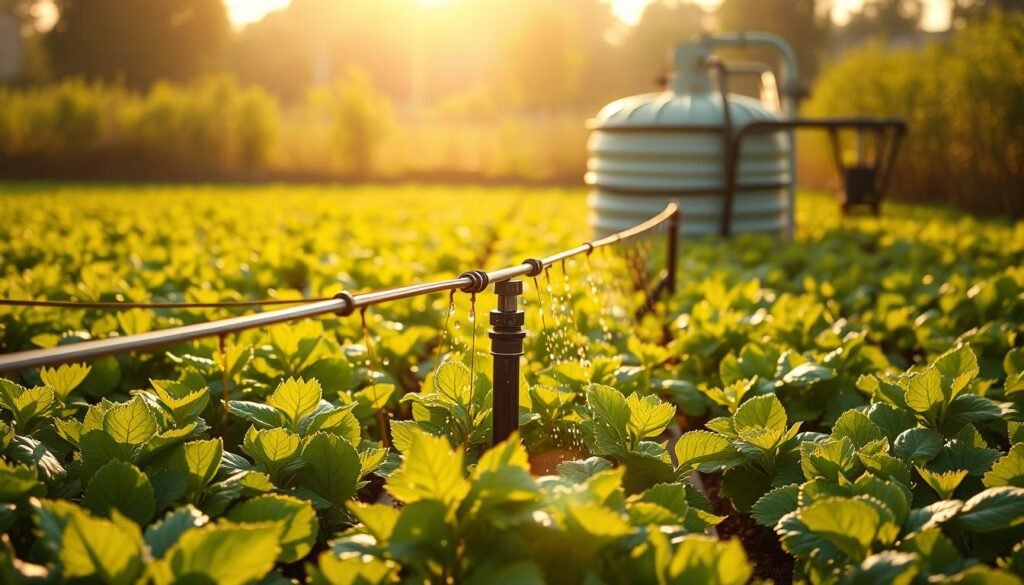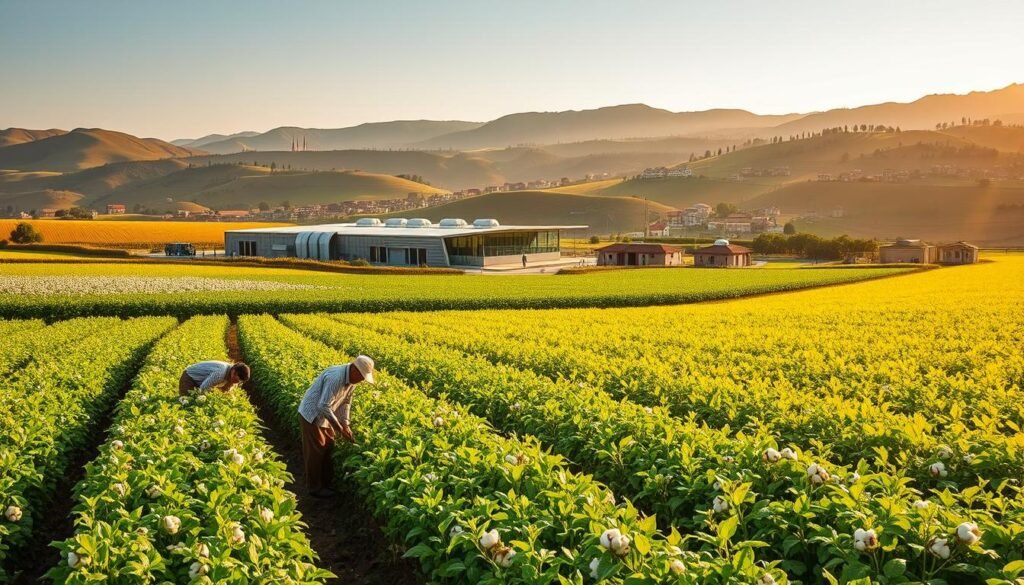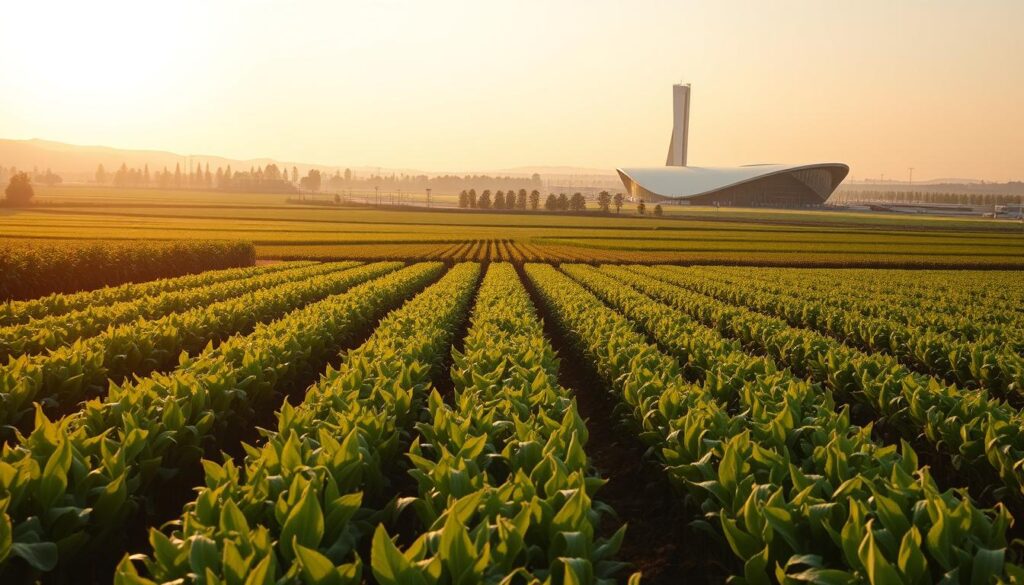Can new tech and smart farming meet the world’s food needs? The global population keeps growing. This puts a big challenge on farming.
Agricultural innovation is changing farming, making it better and more secure. New tech is making farming’s future look bright.
The farming world is about to change a lot. Agribusiness trends show a move to greener and smarter farming. This change will help farming grow and improve.
The Current Agricultural Landscape in Pakistan
Agriculture is very important in Pakistan’s economy and jobs. It helps a lot with the country’s money and gives jobs to many people.
Economic Contribution and Employment Statistics
The farming sector helps Pakistan’s economy in many ways. Agriculture’s share in the national GDP is big.
Agriculture’s Share in Pakistan’s GDP
Agriculture has always been a big part of Pakistan’s GDP. But, its share has changed over time. This is because of things like water problems and new policies.
Rural Employment and Livelihood Patterns
In rural Pakistan, most jobs come from farming. A lot of people in the countryside work on farms. This shows we need farming that lasts long.
Traditional Farming Practices and Their Limitations
Old farming ways in Pakistan are important but have big problems. They don’t make much food and waste resources. We need new farming methods to make more food and keep farming going.
Challenges Facing Pakistan’s Agricultural Sector
Pakistan’s farming faces many challenges. These issues affect the economy and the lives of farmers and rural people.
Water Scarcity and Climate Change Impacts
Water scarcity is a big problem, made worse by climate change impacts. Weather changes and extreme weather hurt crops and farming. We need better water use and farming that can handle climate changes.
Land Fragmentation and Productivity Issues
Land fragmentation is another big issue. Small pieces of land make it hard to use new farming methods. Combining land and working together can help solve this problem.
Limited Access to Modern Technologies and Finance
Farmers in Pakistan don’t have enough modern technologies and finance. They can’t buy better seeds, fertilizers, and tools. Helping farmers with money and technology is key to better farming.
Fixing these problems is important for agricultural industry growth and food safety in Pakistan. By solving these issues, Pakistan can make its farming better.
The Importance of Agribusiness in2025
Pakistan is looking ahead to 2025, and agribusiness is key for growth. Moving from small farms to big business will help the economy. It will also create jobs and boost exports.
Shifting from Subsistence to Commercial Agriculture
Farmers will use new ways to farm, making more food and money. This change will link farms to markets, helping everyone.
Creating Value Chains and Market Integration
Value chains will connect farms to markets, getting better prices for food. This will also cut down on food waste and make farming more efficient.
Economic Growth Potential Through Agribusiness
Agribusiness can really help Pakistan’s economy grow. It will create jobs and increase money from exports.
Job Creation and Rural Development
Agribusiness will bring jobs to rural areas, helping people and reducing poverty. This will happen through new food processing and other businesses.
Export Revenue and Foreign Exchange Earnings
Pakistan can make more money from food exports, earning foreign currency. This will help the country’s trade and keep its money stable.
Agribusiness in Pakistan has a big future by 2025. With smart plans and money, it can grow the economy, create jobs, and increase exports.
| Area of Impact | Current Status | Projected Status by 2025 |
|---|---|---|
| Economic Contribution | Significant contributor to GDP | Major driver of economic growth |
| Employment | Primary source of employment in rural areas | Increased job opportunities in agribusiness sector |
| Export Revenue | Limited export capabilities | Significant increase in agricultural exports |
Technological Innovations Transforming Pakistani Agriculture
Pakistan’s farming is changing fast with new tech. This tech makes farming better and more efficient. It helps grow more food.
Precision Farming and IoT Applications
Precision farming is big in Pakistan now. It helps farmers use less water and fertilizer. It also checks on crops better.
IoT tools like sensors and drones help. They gather data on soil and crops. This helps farmers make smart choices.
Artificial Intelligence and Big Data Analytics
Artificial Intelligence (AI) and Big Data Analytics are changing farming. They give insights on weather, soil, and crops. This helps farmers make better choices.
It also helps them deal with climate change. And it makes farming more productive.
Biotechnology and Improved Crop Varieties
Biotechnology is key in making better crops. These crops fight pests and diseases. They also handle tough weather.
Drought-Resistant Varieties for Pakistan’s Climate
New crops can handle drought. This is great for Pakistan’s dry weather. It helps farmers grow food even when it’s hard.
High-Yield Crops for Food Security
New crops also grow more food. They need less water and fertilizer. This meets Pakistan’s food needs.
With these new tech, farming in Pakistan will get better. It will help feed more people and grow the economy.
Digital Transformation in Pakistan’s Agribusiness Sector
The agribusiness in Pakistan is changing fast. This is thanks to mobile apps, online stores, and digital money services. These changes are making farming better, helping farmers sell more, and making their work easier.
Mobile Applications for Pakistani Farmers
Mobile apps are very important for farmers. They give farmers important info. This includes:
- Weather Forecasting and Advisory Services: Helping farmers decide when to plant and harvest.
- Market Price Information Systems: So farmers can know the latest prices and sell better.
E-commerce Platforms for Agricultural Products
Online stores are helping farmers sell directly to people. This cuts out middlemen and makes farmers more money. It also lets farmers sell their products in more places.
Digital Financial Services for Rural Communities
Digital money services are bringing banking to rural areas. They give farmers access to loans, insurance, and more. This helps farmers and improves their lives.
With digital changes, Pakistan’s farming is set to grow. It will become more productive and reach more markets.
Sustainable Farming Practices for Pakistan’s Future
Pakistan is looking ahead to 2025. It’s important to use sustainable farming to keep food safe and protect the environment. The farming sector is big for Pakistan’s economy. It needs to use methods that save resources, lessen harm to nature, and be good for the planet.
Water Conservation Technologies in Arid Regions
Water is hard to find in Pakistan’s dry areas. Using new tech like drip irrigation and sprinklers helps a lot. These methods send water right to the plants’ roots, cutting down on waste.

Organic and Regenerative Agriculture Methods
Organic and regenerative farming make soil better, add more life, and help the environment. It uses natural stuff, plants cover crops, and changes what crops are grown. This makes soil richer, cuts down on harmful chemicals, and keeps the ecosystem healthy.
Renewable Energy Integration in Farm Operations
Using green energy in farms can make Pakistan’s farming less harmful to the planet. Solar and biogas power can run irrigation, tools, and more.
Solar-Powered Irrigation Systems
Solar irrigation is a green way for farmers, especially in places without power. It cuts down on using fossil fuels and saves money.
Biogas Production from Agricultural Waste
Turning farm waste into biogas is good for two reasons. It makes clean energy and gets rid of waste. Livestock farmers can use manure to make biogas for power.
| Sustainable Practice | Benefits | Impact |
|---|---|---|
| Water Conservation Technologies | Reduced water waste, improved crop yields | High |
| Organic and Regenerative Agriculture | Improved soil health, reduced chemical use | Medium |
| Renewable Energy Integration | Reduced carbon footprint, lower operational costs | High |
By using these green farming ways, Pakistan’s farming can get stronger. It will be ready for the big challenges of climate change and water problems.
Reshaping Agricultural Supply Chains by2025
Pakistan aims to make food more secure and grow its economy by 2025. The way food moves from farms to tables is key. It affects how fresh and available food is.
Reducing Post-Harvest Losses in Pakistan
Less food is lost after it’s picked. Using better ways to handle and store food can help. This way, more food makes it to the market.
Cold Chain Development and Infrastructure
A strong cold chain is needed for fresh food. Investing in cool storage and transport keeps food quality high.
Direct-to-Consumer Models and Farmer Markets
Farmers can make more money by selling directly to people. This cuts out middlemen and opens up markets.
Urban-Rural Market Linkages
Connecting cities and farms is key for direct sales. Improving roads and info systems helps farmers and buyers.
Export-Oriented Supply Chain Improvements
Pakistan wants to sell more food abroad. Meeting global standards and improving logistics is crucial.
Investment Opportunities in Pakistan’s Agribusiness
Pakistan is looking to 2025 with big plans for its agribusiness. It has fertile land and a growing need for food. This makes it a great spot for investors.
Foreign Direct Investment Prospects
Pakistan welcomes foreign money in its agribusiness. You can invest in crops, animals, and new farming tech.
Public-Private Partnerships in Agricultural Development
Working together, public and private groups aim to boost farming in Pakistan. They bring in new ideas and money.
Venture Capital for Pakistani Agtech Startups
Agtech startups in Pakistan are catching the eye of venture capitalists. With the right funding, they can grow big.
Success Stories of Funded Agribusiness Ventures
Many agribusinesses in Pakistan have found funding and thrived. Their stories can guide future investors.
Emerging Investment Areas for 2025
New areas to invest in include precision farming and organic farming. Also, digital services for farmers are on the rise.
With smart investments, Pakistan’s agribusiness can grow a lot. It will help the country’s economy a lot too.
Policy Framework Supporting Agribusiness Growth
A strong policy framework is key for Pakistan’s agribusiness growth. Good policies help agribusinesses grow. This boosts the economy and ensures food for everyone.
Government Initiatives and Subsidies
The government supports agribusiness with subsidies. These help with things like fertilizers and seeds. The goal is to make farming better and help farmers earn more.
- Subsidies on agricultural inputs
- Financial support for farmers
- Training programs for farmers
Regulatory Reforms Needed by 2025
Regulatory reforms are needed to help agribusiness grow more. Making rules easier can help businesses grow and attract investors.
Key areas for reform include:
- Simplifying registration processes for agribusinesses
- Enhancing intellectual property protection for agricultural innovations
International Trade Agreements and Export Potential
International trade agreements can help Pakistan’s farm exports grow. Deals like CPEC open up new trade chances.
CPEC’s Impact on Agricultural Exports
CPEC will help Pakistan’s farm exports by improving roads and cutting costs. This makes it easier and cheaper to send goods out.
Pakistan can also look at trade with Central Asia. Its location is perfect for this.
Case Studies: Successful Agribusiness Models in Pakistan
Pakistan’s farms are changing fast. New agribusiness models are making farming better. They help farmers earn more and live better lives.
Large-Scale Commercial Farming Operations
Big farms are growing in Pakistan. They use new tech and smart ways to farm. They focus on crops that bring in more money.
Corporate Farming Successes and Lessons
Corporate farms in Pakistan are doing well. They grow more crops and sell them easily. Some use special farming tech to save money and grow better crops.
Innovative Small-Holder Farmer Cooperatives
Small farms working together are also doing great. These groups help small farmers. They give them access to markets, tech, and training.
Technology-Driven Agricultural Startups
New tech startups are changing farming in Pakistan. They create apps for farmers, online stores for crops, and ways to send money to rural areas.
Local Solutions to Pakistan’s Agricultural Challenges
These startups solve big problems. They help with money, info, and supply chains. Their tech solutions are really helping farmers.

Global Food Security and Pakistan’s Role by2025
Pakistan is going to play a big part in feeding the world by 2025. It’s in a great spot for farming and has lots of land. The country is getting better at farming thanks to new tech and ways of growing crops.
Export Potential for Pakistani Agricultural Products
Pakistan can send more food to other countries. This will help everyone have enough to eat. They will focus on high-value crops that people want to buy.
High-Value Crops and International Market Access
Pakistan wants to sell more fruits, veggies, and spices to the world. This will make more money for the country. It will also help feed more people by offering a variety of foods.
Meeting Domestic Food Requirements
It’s important for Pakistan to have enough food for its people. The country plans to grow more food using new farming methods. This will help them grow more and waste less food.
Contribution to Regional Food Security
Pakistan is in a good spot to help feed its neighbors. They can send food to other countries. This will make food more stable and available in the area.
Pakistan’s Strategic Position in South Asia
Pakistan is like a food store for the region. They can use this to help feed others and work together with nearby countries. This will help everyone in the area.
Conclusion: The Future of Pakistan’s Agricultural Transformation
Pakistan’s farms are changing fast. This change will help the economy grow and make sure everyone has enough food by 2025. New tech, green farming, and growing businesses are leading this change.
Now, farmers use smart farming and new tech to grow more food. This means they lose less food after it’s picked. Online services and shops help farmers sell their goods better.
Businesses in farming are growing. This means more jobs and better markets for farmers. Farmers are also using water wisely and growing food without harmful chemicals.
Pakistan’s farms will be key in feeding the region and making more money from exports. With good plans and money, farming can make the country’s economy stronger and help people in rural areas.
